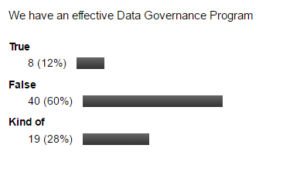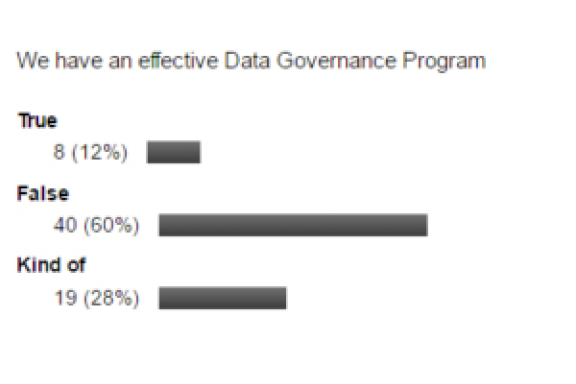Association Analytics® CEO Debbie King recently co-presented a webinar on predictive analytics with Abila’s Carlos Restrepo. During the webinar, Debbie and Carlos asked the audience of association professionals if they had an effective data governance program. Of the 67 replies, only 12% said their association has a data governance program.
 According to this informal poll, only 12% of associations have a data governance program.
According to this informal poll, only 12% of associations have a data governance program.
Consequences of No Data Governance Program
Data governance is a holistic approach to the way you manage, collect, use, and store data. A good data governance program includes a cross-functional team, a defined set of procedures, and a plan to execute and monitor those procedures.
There are consequences to not having data governance.
In the absence of a data governance program, the decisions made about key data systems are made by association staff who “own” the system. When there are different owners for systems (which is very common), the result is inconsistencies in data availability, collection, usability, integrity, and security.
Example of the Consequences
Imagine an association with an Association Management System (AMS) and an event registration system. Each system is managed by a different department and there is no overarching governance. Since there is no shared understanding of what data should be collected, the events team might collect mailing addresses information, but permit addresses in a different format than what is in the AMS. This instantly causes data quality problems. It also can negatively impact user experience if there is no integration or procedures to update the AMS. Members may believe that by updating their address in one system, it will update in all others.
If your association doesn’t have a data governance program, this scenario may be all too familiar.
Short-Term and Long-Term Impact
Without data governance, there is an inconsistent application of validation and business rules which leads to inefficiencies and data quality issues. There are long-term impacts as well. Ultimately, poor quality data can lead to a decrease in the trust level of the data in the system, which in turn can lead to the abandonment of the system by business users.
Association Analytics® works with associations to develop sensible data governance policies. For assistance with your data governance, contact us at [email protected].



